| Srl | Item |
| 1 |
ID:
131857
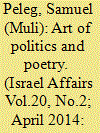

|
|
|
|
|
| Publication |
2014.
|
| Summary/Abstract |
The article demonstrates the potency and volatility of political lyricism by comparing two masters of the trade, the French Jacques Prevert and the Israeli Aryeh Sivan. Although writing in two dissimilar cultures and witnessing disparate political environments, the poetry of Prevert and Sivan is similar in many ways. They are both keen observers of their societies' woes and both are equally critical. Their accounts are s are emphatic and caring and strewn in their passionate, affectionate and brutally honest verses, Prevert and Sivan are the quintessential models for contemporary political poetry. Both poets, despite their disparate cultures and dissimilar local experiences, painstakingly probe and penetrate the political realities around them with velvet nails
|
|
|
|
|
|
|
|
|
|
|
|
|
|
|
|
| 2 |
ID:
131855
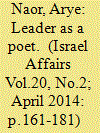

|
|
|
|
|
| Publication |
2014.
|
| Summary/Abstract |
This article analyses Ze'ev Jabotinsky's Zionist ideology as expressed in his political poetry. It includes inter alia lessons from the pogroms, the need for emergence of 'a new Jew' who would show by his conduct that he is 'a son of kings', who is ready to either die or capture the mountain, believing in the Jewish national right over the Land of Israel on both banks of the Jordan, as well as in the rights of its Arab and Christian inhabitants. These and other ideological principles appear in his poetry alongside a war of words with the Zionist left.
|
|
|
|
|
|
|
|
|
|
|
|
|
|
|
|
| 3 |
ID:
131854
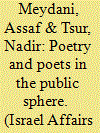

|
|
|
|
|
| Publication |
2014.
|
| Summary/Abstract |
Political poetry is not tested by its impact and the number of its readers but in its very participation in the public discourse on the issues of the day. Poetry moves between forces that focus the attention of its audience inwards, to the lyrics of the poems, and the forces that connect to the social, cultural, and political climate in which the poems are published. These movements reflect the power of poetry, which, using language, breaks the barriers that exist between people - individuals or groups, as well as between these individuals or groups and reality. This way, the poet serves as the element that formulates the informal cultural feelings in society and offers an interpretive package of the existing reality, as well as the alternative reality. Poets place their 'truth' within the perception of reality, and this truth can compete in the public arena with the 'truth' that is portrayed by politicians.
|
|
|
|
|
|
|
|
|
|
|
|
|
|
|
|
| 4 |
ID:
131859
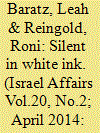

|
|
|
|
|
| Publication |
2014.
|
| Summary/Abstract |
This article seeks to reflect the narrative of discrimination in the writing of Israeli Palestinian women poets through the motif of Silence. This narrative emerges from the analysis and categorization of this motif in some 200 poems, written in Arabic and translated into Hebrew, thus revealing the poets' attitudes to social and political issues. This article shows that the poets' identity is perceived as the marginalized 'other' in Israeli society, not only in terms of nationality and ideology but also in terms of gender.
|
|
|
|
|
|
|
|
|
|
|
|
|
|
|
|
| 5 |
ID:
131869
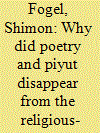

|
|
|
|
|
| Publication |
2014.
|
| Summary/Abstract |
This article reviews the process by which the presence of piyut - liturgical poetry - in (Ashkenazi) Religious-Zionist High Holy Day prayer books was curtailed. Piyut is examined here, in part, as a representative of non-institutionalised prayer reflecting grassroots tradition (and varying ethnic custom) as opposed to the letter of halakhic law. From this perspective, the process of decreasing the use of piyutim will be examined as the result of both the Orthodox movement and modern literary critique of piyut poetics.
|
|
|
|
|
|
|
|
|
|
|
|
|
|
|
|